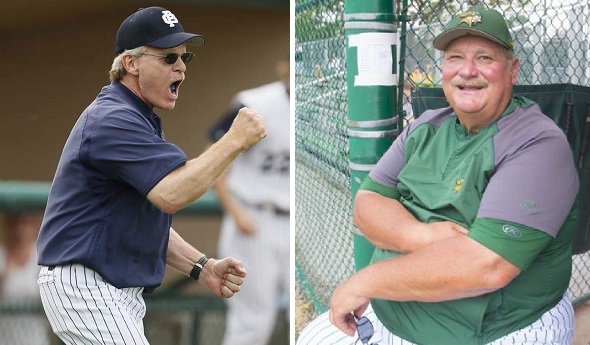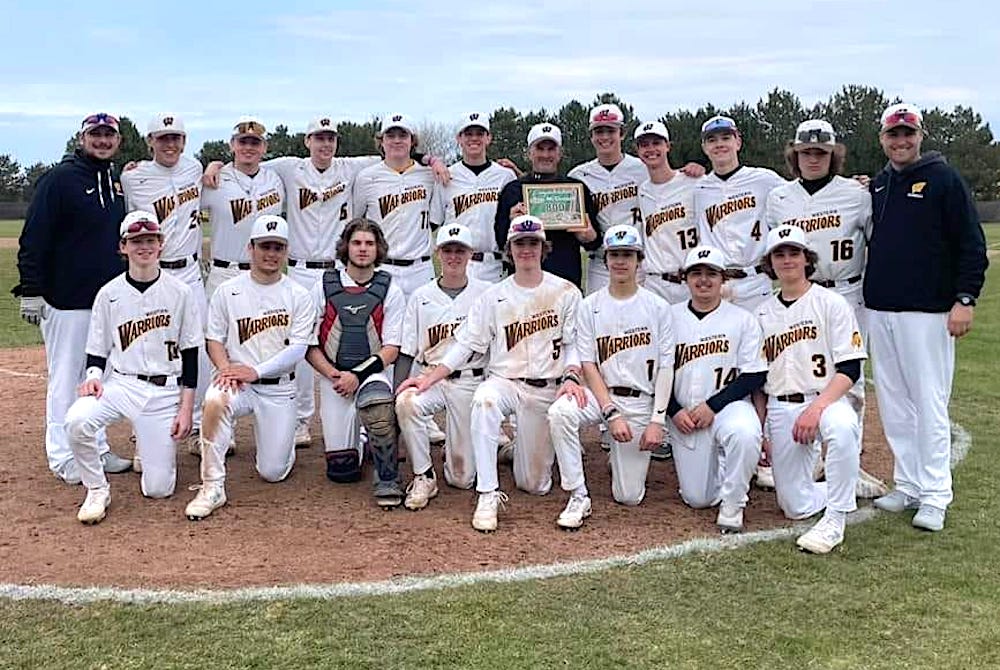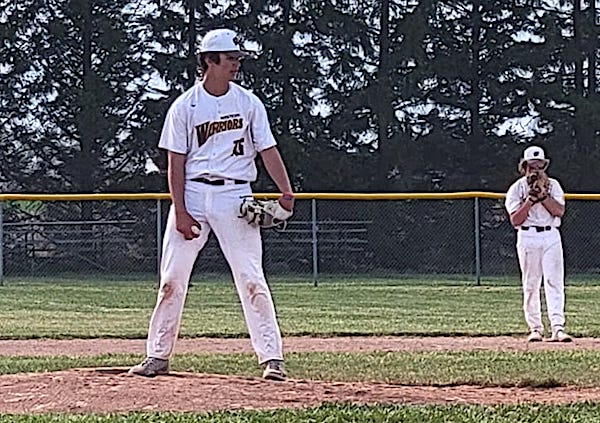
Pointes' Pride Instilled by Longtime Leaders
By
Tom Markowski
Special for Second Half
May 31, 2017
GROSSE POINTE – Neither Frank Sumbera nor Dan Griesbaum were raised in Grosse Pointe.
 But no one, at least at the high school level, has done more to enhance and promote baseball in the Pointes than this long-serving pair.
But no one, at least at the high school level, has done more to enhance and promote baseball in the Pointes than this long-serving pair.
Sumbera, 69, is in his 45th season as coach at Grosse Pointe North and Griesbaum, 64, is in his 34th season at Grosse Pointe South. In this sport the rivalry that exists between Grosse Pointe’s two public high schools is as good as it gets. Sumbera holds the upper hand in MHSAA Finals titles, 2-1, and Griesbaum has the edge in District titles, 23-14.
This last statistic is notable in a sense that the two programs are often paired in the same District, as they are this season. South will host North in a Division 1 District Semifinal at 10 a.m. Saturday.
This season there is an added twist to the much-anticipated community showdown. Grosse Pointe Woods University Liggett, for the first time, will compete in the Division 1 tournament lined up on the other side of the bracket from North and South. University Liggett will play Detroit East English in the other Semifinal at 11:30 a.m. The winners will play for the title approximately 2 p.m.
University Liggett won four MHSAA Finals titles the past six seasons, two in Division 4 and two in Division 3, including last season in the latter. Coach Dan Cimini, knowing he had a strong team returning, petitioned the MHSAA to opt up to Division 1 for this season and 2018.
So far the Knights have proven they can hang at the Division 1 level. They are ranked No. 2 in the latest poll released by the Michigan High School Baseball Coaches Association.
And Cimini’s group received a break in the draw as it won’t have to defeat both North and South to win the District title.
This is Cimini’s 14th season as head coach, and he tips his hat to the job Sumbera and Griesbaum have done in laying the groundwork.
“Frank has been there forever,” Cimini said. “Dan has been there a long time. I feel old, and I’m 48. I’ve coached 22 years. No doubt about it, those guys have set the standard.”
Cimini grew up in Grosse Pointe and competed in the city’s strong Little League program. He played for Griesbaum at South and played four years in college, two at Macomb College and two at University of Detroit Mercy. He was part of the 1987 South team that reached the MHSAA Semifinals for the first time in school history.
Cimini said the quality of baseball has remained strong in the community over the years but noted there have been some changes.
“The Little Leagues are phenomenal,” he said. “The Federation ball is phenomenal. But there aren’t as many kids playing. Now there are seven teams playing in the (Little League) majors. Back when I played there were 13 of 14. I miss those days. If I could take myself back, that’s where I’d go.”
At least in the modern era, one must point to Sumbera as the person most responsible for the quality of baseball being played at the high school level.
Sumbera played three sports at Chesaning High – baseball, basketball and football – and then went on to Central Michigan where he played basketball.
 Upon graduation Sumbera went looking for a job and received a tip from a college roommate. Sumbera was told that Grosse Pointe High would be splitting into two schools, North and South, and that they needed teachers, and, naturally, coaches. North opened for the 1968-69 school year, and Sumbera was hired as an assistant junior varsity football coach. In 1973 he became the assistant varsity baseball coach, and the next season he took over the baseball program.
Upon graduation Sumbera went looking for a job and received a tip from a college roommate. Sumbera was told that Grosse Pointe High would be splitting into two schools, North and South, and that they needed teachers, and, naturally, coaches. North opened for the 1968-69 school year, and Sumbera was hired as an assistant junior varsity football coach. In 1973 he became the assistant varsity baseball coach, and the next season he took over the baseball program.
“We won the District that year,” he said. “I’ll never forget it. We beat (then Detroit, now Warren) DeLaSalle, 2-1, in the final.”
Sumbera has coached some of the best teams in the state. His 2006 Division 1 championship team was 38-1. His 1980 Class A championship team was probably his best. Five players on that team were selected in the Major League Baseball amateur draft including Bill Babcock, one of the top pitchers on that team. Babcock’s son, Luke, will enter the ninth grade next fall is expected to enroll at North and play for Sumbera.
That’s the way it is in the Pointes. This large community that borders Detroit’s eastside is infectious. It’s common for someone who grew up here to remain in the area and raise his or her own family.
“A lot of the kids I coached in the 80s, I’m coaching their sons,” Sumbera said. “They play a lot of baseball here. As they grow through the ranks to high school, (Griesbaum) and I have to make cuts. You might have 250 at the Little League level, and by the time I get them we have like eight.
“The North-South rivalry is as good as any around. I coach football, and it’s intense every year. In baseball it’s as good a rivalry as there is in the state. It’ll be the fifth time we will have played South (this season). In our last doubleheader we won the first, 12-6, and lost the second, 3-2, in eight innings. That was a crusher. It’s big. The kids know it. The families know it. They all go to church together and play against each other during the summer.”
Griesbaum, a graduate of St. Clair Shores South Lake and Central Michigan, where he played baseball, said the level of competition is remarkable especially when one considers the schools do not have open enrollment. The only way one can play for North or South is to live in the school district.
Griesbaum got his start as an assistant under Sumbera (1980-83) before going to South in 1984.
“There’s nothing like a North-South game,” he said. “Our rivalry is one of the best. It’s a baseball community. My 6-year-old grandson plays T-ball. You look at what North and South have accomplished. There’s the (Grosse Pointe) Farms and City (Little League) teams. Then there’s the success of the Redbirds that (former Detroit Tiger) Dave Bergman ran. We run a (Christmas) Holiday hitting camp. We have 75 kids the first day and 75 more the next. It’s for the second through the sixth grades. We want to expose baseball at an early age.”
Some have expressed displeasure that all three Grosse Pointe schools are in the same district. Cimini scoffs at that thought. He said there are many districts throughout the state that have more than their share of quality teams.
The last two seasons North and South were in separate Districts, and they won their respective Districts both years. In 2015, they met in a Division 1 Quarterfinal, and South won. It was the Blue Devils’ seventh trip to the Semifinals, a record (tied with Saline and Grand Ledge) for a public school in Division 1/Class A.
Cimini said he’s looking forward to seeing what his team can do against the established powers.
“I can’t wait,” Sumbera said. “The whole thing is, come June 3 you have to be ready to play.”
 Tom Markowski is a columnist and directs website coverage for the State Champs! Sports Network. He previously covered primarily high school sports for the The Detroit News from 1984-2014, focusing on the Detroit area and contributing to statewide coverage of football and basketball. Contact him at [email protected] with story ideas for Oakland, Macomb and Wayne counties.
Tom Markowski is a columnist and directs website coverage for the State Champs! Sports Network. He previously covered primarily high school sports for the The Detroit News from 1984-2014, focusing on the Detroit area and contributing to statewide coverage of football and basketball. Contact him at [email protected] with story ideas for Oakland, Macomb and Wayne counties.
PHOTOS: (Top) Grosse Pointe South's Dan Griesbaum, left, and North's Frank Sumbera both have led their respective programs for more than three decades (Sumbera for more than four). (Middle) University Liggett coach Dan Cimini played for Griesbaum at South and has built a top program in the community as well. (Photos courtesy of the Griesbaum family, C&G Newspapers and the University Liggett baseball program.

BC Western Writing Storybook Season with Celebrations, Early Success
By
Paul Costanzo
Special for MHSAA.com
April 26, 2023
Before a single pitch was thrown this season, there was plenty for the Bay City Western baseball program to be excited about.
 Some of it was historic: Coach Tim McDonald entered the year three wins away from 800 in his career, and, during the season, the program is set to celebrate the 10-year anniversary of the 2013 Division 1 championship team.
Some of it was historic: Coach Tim McDonald entered the year three wins away from 800 in his career, and, during the season, the program is set to celebrate the 10-year anniversary of the 2013 Division 1 championship team.
But the present was just as exciting.
Led by a strong group of seniors that started a program rebuild in 2021, the Warriors figured to have one of their strongest teams in years.
Then the pitches started getting thrown, and the excitement may have been kicked up a notch.
Western is 14-0 to start the season, and living up to its lofty expectations in a year where it just feels like everything is already a celebration.
“It’s kind of freaky the way it’s kind of lining up right now,” said senior pitcher Ben Kohany. “We have our goals in mind, but we’re still taking it game by game. Obviously, there is that pressure (from the program’s past success), but we’re just trying to take things slowly.”
Western’s success on the field this season is the result of a simple formula: good pitching, solid defense and the ability to manufacture runs.
It’s a formula that helps the Warriors to focus on what’s directly in front of them, and not look ahead when they have big postseason goals that could otherwise distract them.
“We just play together as a team – we trust each other, make plays and get the job done,” junior catcher Bryce Neitzel said. “Every day in practice we work on the fundamentals. Especially with bunting, we do a station of bunting every day. I feel like it does help, because whenever we’re in a situation in a game, we’re prepared for the moment. We kind of expect it.”
It’s also a formula that has won McDonald and the Warriors a lot of games over his 31 years as a coach – 811, to be exact.
“We have a philosophy, things we emphasize and things we work on,” McDonald said. “We’re kind of known for our small ball, and we kind of got away from that. This year’s team, one of the many things they understand is that at some point, that’s going to become important. They’re just rock solid. They’re a good practice team, and that translates.”
 When the season began, McDonald had 797 career wins, which put him 12th on the MHSAA’s all-time list. It took just three games, and a bit of serendipity, to become the 11th coach in state history to reach 800.
When the season began, McDonald had 797 career wins, which put him 12th on the MHSAA’s all-time list. It took just three games, and a bit of serendipity, to become the 11th coach in state history to reach 800.
The Warriors swept Flushing in their season-opening doubleheader, which gave McDonald the chance to get win No. 800 against his alma mater, Mount Pleasant Sacred Heart, in a game that was a late addition to the schedule.
And just to make it a little more personal, Sacred Heart is coached by Earl Hartman, who coached McDonald and is one of the 10 ahead of him on the all-time list; and McDonald’s nephew, Joe McDonald, was the starting pitcher for the Irish.
“It sounds like a Hollywood script, but that’s just how it all fell into place,” McDonald said. “It was certainly a neat day, and that just added to it.”
While McDonald knew how close he was to the milestone coming into the season, he wasn’t planning on making a big deal of it. The people around him, of course, had other plans.
“They had cupcakes, and my AD got a plaque made for me,” McDonald said. “Somebody did some work behind the scenes, and all of that is appreciated. I’m proud to represent this program. If me, as the head coach, has a lot of wins, that means the school has a lot of wins. I’ve been fortunate to be in a good baseball community. They had good baseball before I came. I’m proud of the foundation that we built, and I think it’s just continued on.”
Getting to be part of that historic moment was a thrill for the current Western players.
“That was super cool,” senior third baseman Miles Yurgaites said. “That’s a lot of wins. It was a super cool moment, and a super fun day.”
The timing was also great for the Warriors, and not just because of the opponent in Game 3 of the season.
“I’m glad it happened early in the season,” McDonald said. “We got to enjoy the moment, and now we can move onto some of our goals that we set for ourselves. That worked out in a good way, as well. Now this team, they’ve become focused, because we still got a lot of work ahead of us. They’re staying humble in their approach, and every one of them knows they have some things they can get better at. As a coach, that’s all you can ask.”
Helping McDonald drive home that message is a trio of assistants who are Western alumni: Brian Patrick, Brendan “Bubba” Harrison and Brandon Wise. Patrick has been on the staff for 12 years, while Harrison (2013) and Wise (2014) were each part of Finals championship teams for the Warriors.
Not only does that give McDonald the luxury of coaching with people who know how a championship program is run, it also gives the Western players a daily look at what it takes to get back there.
“It does help,” Neitzel said. “They have all that experience, and they’ve shared all their memories with us. It makes us want to do what they did.”
 Paul Costanzo served as a sportswriter at The Port Huron Times Herald from 2006-15, including three years as lead sportswriter, and prior to that as sports editor at the Hillsdale Daily News from 2005-06. He can be reached at [email protected] with story ideas for Genesee, Lapeer, St. Clair, Sanilac, Huron, Tuscola, Saginaw, Bay, Arenac, Midland and Gladwin counties.
Paul Costanzo served as a sportswriter at The Port Huron Times Herald from 2006-15, including three years as lead sportswriter, and prior to that as sports editor at the Hillsdale Daily News from 2005-06. He can be reached at [email protected] with story ideas for Genesee, Lapeer, St. Clair, Sanilac, Huron, Tuscola, Saginaw, Bay, Arenac, Midland and Gladwin counties.
PHOTOS (Top) Bay City Western celebrates coach Tim McDonald's 800th win April 8. (Middle) The Warriors play in the Bay County Invitational on April 15. (Photos courtesy of the Bay City Western baseball program.)

